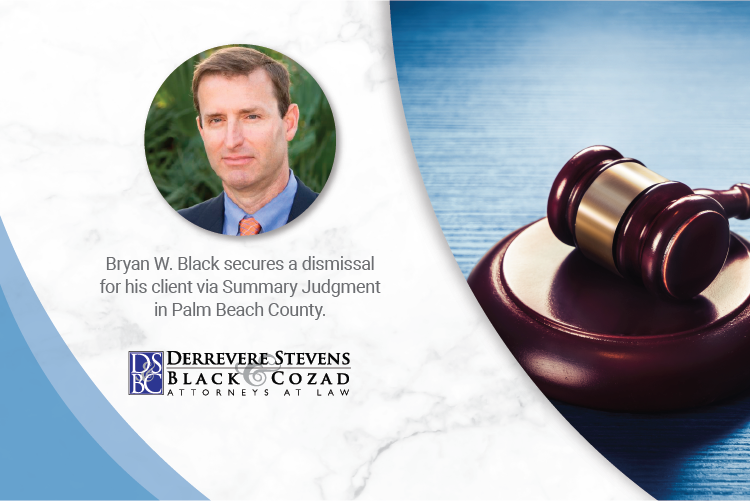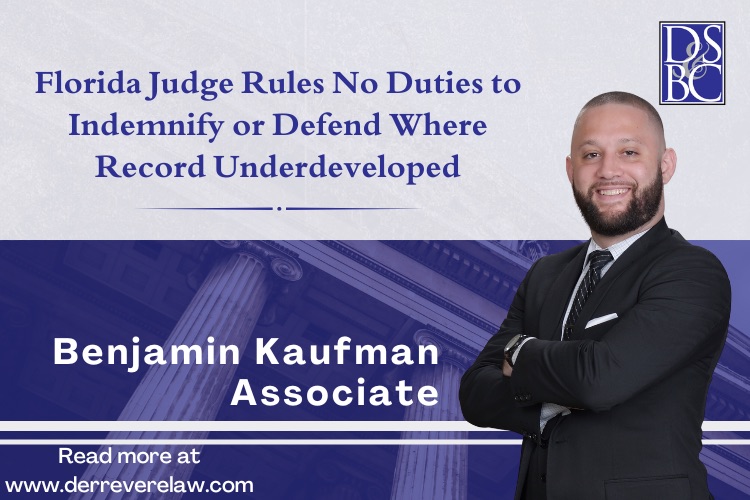Bryan W. Black Obtains Final Summary Judgment in Personal Injury and Property Damage Case involving Certified Mold Assessor and Indoor Air Quality Testing.

April 13, 2021 – Haskett, et. al. v. Hibiscus Springs Rental Homes, et. al. This action arises out of claims asserted by four (4) Plaintiffs against a Rental Home company, Property Management company, various individual employees and a Certified Mold Assessor & Air Quality Testing Company (“Defendant”). Plaintiffs filed their initial complaint in February 2020 asserting that a window at the Subject Rental Residence was leaking and despite pleas to the rental complex, continued to leak for a two year period. A mother, adult daughter and the daughter’s two boys allegedly developed health conditions as a result of exposure to toxic mold. Sometime in 2018, Plaintiffs noticed that the paint was bubbling and coming off the wall under the front bedroom window, revealing what appeared to be mold. Plaintiffs testified that they attempted to clean the mold but ultimately hired a mold testing company to test the conditions. After the mold testing company inspected and tested the conditions of the Subject Residence, they concluded that there were high levels of mold present in the Subject Residence. Upon receiving this information, Plaintiffs left the residence and moved into a hotel. Plaintiffs also left many of their personal belongings in the home, as they were under the impression that their personal effects were contaminated by mold. Thereafter, Plaintiffs only returned to the Subject Residence once to remove limited items from the garage and return the keys for the Subject Residence to the rental complex.
It was not until after Plaintiffs left the Subject Residence and returned the keys to the Management Company for the rental complex, that Defendant Certified Mold Assessor & Air Quality Testing Company was asked by the rental complex to perform Indoor Air Quality Testing at the Subject Residence. Defendant set up its equipment, turned it on, sampled the air at the Subject Residence and then left the property. Thereafter, Defendant provided the rental complex a copy of its report and lab results. Defendant had absolutely no communications with Plaintiffs before, during or after visiting the Subject Residence.
During litigation of the case, Defendant served all the Plaintiffs with requests for admissions and deposed the two (2) primary Plaintiffs (mother and adult daughter). Both testified that the Plaintiff did not contract, pay, rent, communicate, retain, or rely upon any representations made by the Defendant. Further, Plaintiffs testified that they did not know who Defendant was or what Defendant did with regard to the Subject Residence. Plaintiffs solely relied upon their own mold testing company when deciding to leave the Subject Residence and abandon their personal property, all of which occurred prior to Defendant’s first and only visit to the Subject Residence.
After a review of the record evidence, pleadings, answers to interrogatories and testimony, the Trial Court ruled that there was no genuine issue of material fact and Defendant was entitled to Final Summary Judgment as a matter of law. The duty element of negligence is a threshold legal question; if no legal duty exists, no action for negligence may lie. Florida courts have consistently held that the issue of whether a defendant owes a duty to a plaintiff is a question of law for the courts to decide. The Court also found that the Plaintiffs third-party beneficiary claim likewise failed as the record evidence unrefutably established there was no contract, no breach of a non-existent contract and no resulting damages. Nothing Defendant did, or did not do, would have, as a matter of law, created a duty between Defendant and Plaintiffs; nor could anything Defendant did, or did not do, be deemed the proximate cause of Plaintiffs’ alleged damages.
The matter is not final, and subject to change, until the expiration of the relevant periods for any motion for rehearing and/or the time for appeal has concluded.




